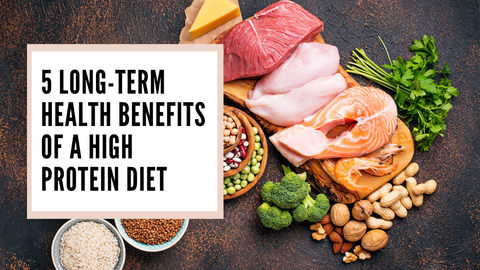BioHealth Nutrition Blog
How Red Spinach Can Improve Your Workouts

Before we made Vitality, we spent months researching the wonder-ingredient; Red Spinach. With a myriad of health benefits, it also can be used as a non-stimulant alternative to a pre-workout. But can taking red spinach help improve your workouts?
Recipe: Vegan Immunity Protein Smoothie

This smoothie is delicious and healthy way to boost your immunity and support your fitness goals. Packed with nutrient-dense ingredients that are rich in vitamins, minerals, and antioxidants, this smoothie is the perfect way to nourish your body and strengthen your immune system.
Recipe: Strawberry Shortcake Protein Oatmeal

This easy strawberry shortcake protein oatmeal recipe is a perfect way to start your day and it's incredibly delicious. It's quick, easy and packed full of nutrients and protein. It only takes a few minutes to make and will keep you full and satisfied. This breakfast recipe will surely become a fast favorite in your home
Recipe: No Bake Horchata Protein Bites

Horchata is easily one of the best flavors in the world. These no bake protein bites are super easy to make with absolutely no baking required. These bites are healthy, great for breakfast or any time you need a quick snack on the go. Kid-friendly, low calorie, and gluten free.
How Protein Helps Healthy Hair Growth

5 Easy Ways To Sneak Fitness Into Your Day

With busy schedules and complications in life, getting in a workout can be difficult from time to time. Thankfully, there are plenty of ways to get moving without setting aside time to get a full workout in. As long as you're taking time to move, even for just a few minutes, you're doing the best thing you can for your brain and body. Here's a few ways you can easily sneak some fitness into your day.
Recipe: Blackberry Protein Breakfast Smoothie

Blackberries are typically overlooked as the go to berry, however they pack some serious perks. Not only do they taste great on their own, but you can use them as a fruity base to any smoothie for a boost of fiber, vitamin C, K and manganese. You can use fresh or frozen blackberries for this easy breakfast smoothie to start your day.
Juice Cleanses: A Comprehensive Guide

A lot of people turn to detox methods to be able to do a 'reset' on nutrition habits. Juice cleanses have become a very popular method for detoxifying the body and shedding a few pounds in a very short period of time. Are they safe and effective? What exactly are they? Here, we explore the benefits and drawbacks of juice cleanses.
Triple Berry Protein Smoothie

We love a good smoothie, especially with our proteins. Smoothies are a great way to combine protein and other nutrients together to create a satisfying shake that's perfect for any time of day. This delicious triple berry protein smoothie is easy to make and perfect for on-the-go nutrition or any time of day.
5 Long-Term Health Benefits of a High Protein Diet

With a high protein diet, you focus on lean proteins and still include some carbs so that you're getting enough nutrients and fiber. While we know this kind of a diet can help with building lean muscle and help with weight loss in the short term a high protein diet can have many benefits for your long-term health.
Recipe: Antioxidant Protein Smoothie

You've committed to your health, but now what? It's easy to take a protein shake and turn it into a smoothie with additional benefits that's amazing for your health. This delicious antioxidant smoothie recipe is high in protein, nutrient dense and rich in antioxidants that'll have you glowing from the inside-out.
Why Your Protein Should Be Pasture Fed

Many people rely on animal-based protein sources, such as meat, dairy, and eggs, to meet their protein needs. However, the way that these animals are raised can significantly impact the quality and nutritional value of their products. This is something we take seriously at BioHealth, ensuring that all of our proteins are premium pasture fed. Read on to find out why BioHealth's proteins are guaranteed to be the cleanest proteins you can find.
Skin 101: How to Support Your Body's Biggest Organ

A vital organ, skin is also the largest organ of your body. While skin plays a crucial role for the body, it is one of the most overlooked regarding health discussions. Beyond its soft texture and attractive appearance, the skin helps regulate body temperature and protect other body organs from harmful organisms.
While maintaining your skin can help you reduce its aging process to some extent, its proper care can support better health. Read on and learn how to support and best care for this hard-working organ.
Sugar Cookie Protein Latte Recipe

There's no better time of year to indulge than the holiday season. However with all of the events and parties, it can be really easy quickly to over-indulge. This sweet and nostalgic sugar cookie latte recipe is packed with protein while keeping you satisfied while keeping off the extra cookie calories.
The Beginner’s Guide to Meal Prepping

Meal prepping is a great way to stay on track with your fitness goals, but it can also be overwhelming. If you're new to the idea of meal prepping, don't worry!
We're here to help you find out what it means, why it's important, and how you can make it work for you.
8 Tips To Avoid Overeating During the Holidays

While you might be tempted to binge on some of your favorite treats during the holidays, it's important to avoid them altogether. It's better to cut out unhealthy foods from your diet than try to control yourself around them.
How Nutrition Can Affect Your Sex Life
The 5 Worst Foods for Gut Health

Do you know that the health of your gut could control your weight, blood sugar, liver function, and mental health? Learn which foods are best for gut health and which ones you should avoid.
5 Anti-Inflammatory Foods to Add to your Diet

Studies continue to show that the food we eat, especially animal proteins derived from red meat, is a major contributor to inflammation. The good news is that recent studies have indicated eating anti-inflammatory food is the best way to combat the condition. Try adding in these anti-inflammatory foods in your diet.
Caramel Chai Protein Shake Recipe

If you're feeling the Fall vibes like we are, then you're getting more crafty with your recipes. Spice up your protein shake this week and make this very delicious caramel chai protein shake. We're using BioHealth's Caramel Macchiato protein powder for a caramel twist on the classic chai.
The Importance of Protein for Thyroid Health

Protein is essential for keeping your thyroid healthy. It's one of the most important parts of a balanced diet, and it plays a crucial role in the function of your thyroid gland. Read on to find out why.
Pumpkin Spice Collagen Latte

Once fall is around the corner, suddenly you start seeing pumpkin spice everwhere. Most famously, the pumpkin spice latte returns to your local coffee dealers, however these drinks can be full of sugar and empty calories. While they may satisfy your sweet tooth, they may do more harm than good. Luckily, we've created our own version of a healthier pumpkin spice latte featuring our Hydrolyzed Collagen that's even better than the original.
Easy Pumpkin Caramel Latte Recipe

If there's one thing we know, it's that we're obsessed with flavor. Fall flavors happen to be at the top of our list. Luckily with our delicious proteins, there are endless ways to make recipes for any time of the year. This fall, our morning routine is getting a little sweeter with this easy, pumpkin caramel latte recipe with 8g of protein, courtesy of Miranda Harris, founder of Habitual Fitness.
Eating Well For Better Mental Health

Most people think about diet when it comes to their waistline, however your mental health depends heavily on the foods you consume. Foods can contribute to: Better memory, happiness, a stronger immune system and increased energy levels.
Everyone needs to eat, and food can be a very powerful lever for mental health. Here are some foods that are known to improve your mood and overall mental health:
